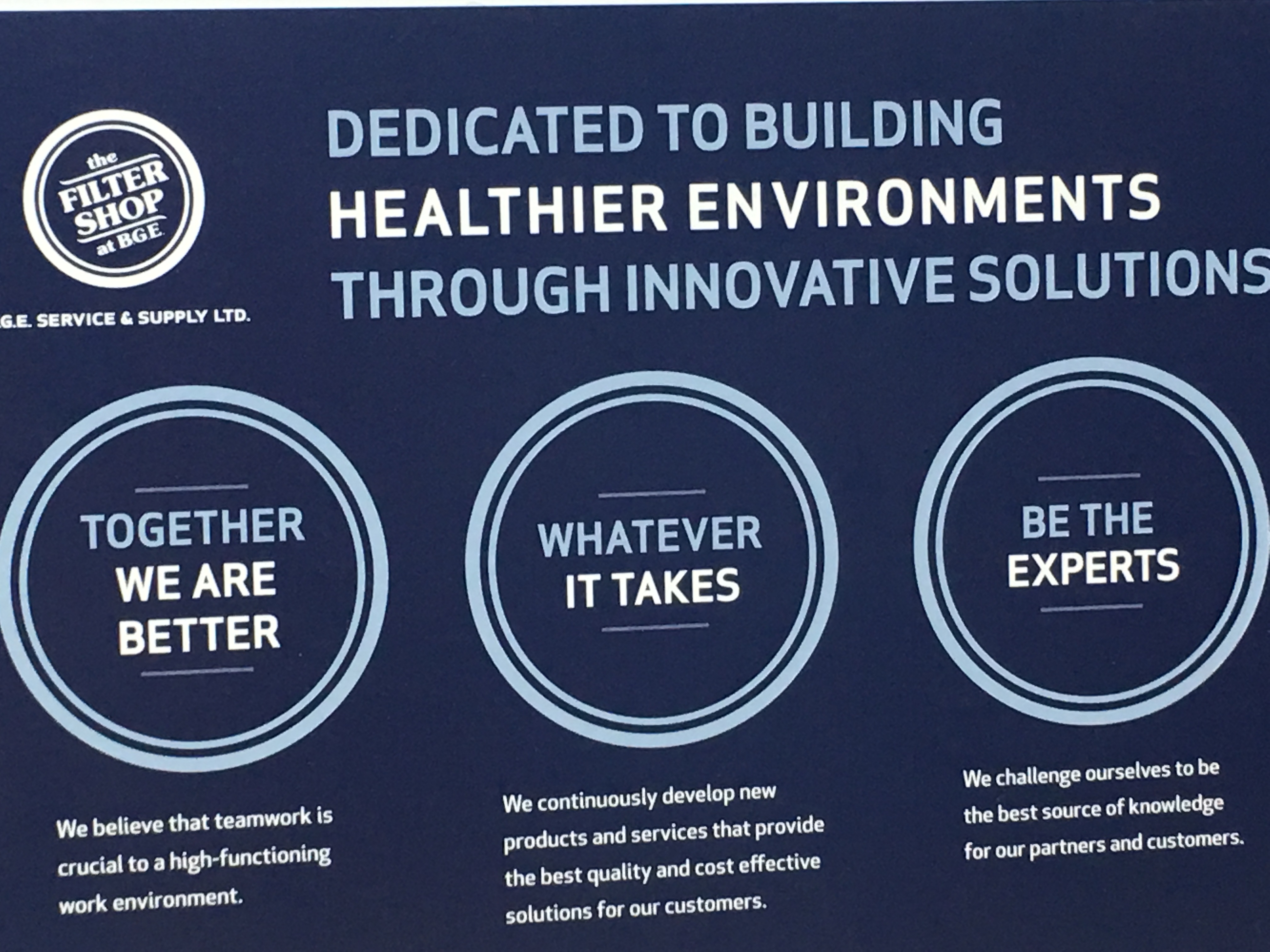
Featuring : The Filter Shop and CCI-LEX
Let’s say you have a job that needs to be filled… The job is easy to learn and do well but difficult to hire for. People don’t stay or have the necessary work ethic and orientation to be good team members. How do you find employees who will do the work AND have the right attitude, work well with others, and stay over time?
Many employers in manufacturing, hospitality, food processing, and retail, fed up with the revolving door of employees are increasingly focusing on immigrant populations to find that perfect fit. When employers turn to employment and immigrant serving or community organizations to find employees, they are delighted by having workers with a strong work ethic, great attitude and desire to be with the organization commitment. The only downside is the lower English proficiency that can be an obstacle in communication.
After ensuring that candidates can complete the required tasks and have the desired attitudes, employers hire multiple people from similar ethnic background and language groups, often keeping them together in teams with one or two more English proficient employees serving as volunteer translators.
This approach solves problems for both sides. On one hand, newcomers seeking a stable and routine work environment while they get used to Canadian culture, are gainfully employed. Because they are referring qualified friends and relatives, they also get to work with people they know and like. This referral process brings good candidates to employers and cuts down on hiring time.
Employers solve the problem of finding workers who are good fit and don’t have to keep hiring people who never wanted to be there in the first place. It is common for employers who hire immigrant employees to say how happy they are to have made that decision, and what a big difference the newcomers have made to the bottom line of their business. Immigrant employees are grateful for the work, show up on time, work hard, and are loyal to their employers.
Sounds perfect doesn’t it?

Well let’s not get ahead of ourselves. Although this arrangement takes care of immediate workforce needs and initially has happy people on both sides, there are problems that emerge over time partly because the workforce is not fluent in English, and partly because all human beings need to feel that they are realizing their potential to be happy in the workplace.
Here are some typical problems: Communication can suffer as more complex jobs are assigned, and intercultural misunderstandings significantly slow down productivity and undermine the capacity of employees to develop their skill. Low language proficiency also handicaps the company in its attempts to reach business goals. Silos between groups can emerge and procedural misunderstandings amplify. Safety and regulatory constraints may not be clearly understood.
But there are ways to address this and continue the happy relationship that started at the beginning of this employment story.
One employer, keenly aware of these issues, decided to partner with an English language provider to develop newcomer language skills. The significant improvements in many workplace areas resulting from this investment has gone far beyond initial expectations. The employer is The Filter Shop and the English language provider is CCI-LEX.
In terms of inclusivity, The Filter Shop is already a star player. When you walk into the reception area, you are immediately struck by how welcoming and inclusive it is. Helpful employees interact so joyfully with each other and with everyone who walks in, that you wish you were working there yourself! Throughout the manufacturing and warehouse areas are signs in multiple languages, visuals for standard procedures, smiling employees who wave as you walk by, and a multicultural workforce that spans all levels of the organization.
As is typical of employers who are already engaged in building inclusive and welcoming workplaces, even this portrait of success was not enough for The Filter Shop. Decision-makers were concerned about the issues emerging because of low levels of English proficiency and decided to take action.
Want more cross-cultural communication articles?
Here’s an interesting read about cross-cultural communication barriers.

To get started they invited CCI – LEX, an English-language service provider with a very strong reputation for success, to meet with them and discuss their workplace specific English language improvement needs and ways to measure outcomes. CCI-LEX project coordinators came to The Filter Shop to conduct a workplace language assessment. They used company documentation, interviews and observation, to identify specific vocabulary employees needed to be able to understand and use. The result of this assessment was a workplace English language curriculum tuned to the company’s exact needs.
The curriculum also included general requirements of HR for employees to understand and be able to discuss safety terminology, employment standards, payroll and other HR topics. Practice for typical worker supervisor conversations was a regular part of the sessions. Instructors taught the classes on site two times a week after workers had completed their usual eight-hour shift. Despite a rigorous three month-long schedule of a full day’s work followed by two hours of English language instruction two times a week, employees enthusiastically registered for and participated in the classes, and absences were rare. Employees planned amongst themselves for childcare and carpooling to allow each other to attend the classes.
I first found out about this project from The Filter Shop’s HR Coordinator, Anu Prasanna who presented the results of their initiative during an inclusive employer seminar I provided several months earlier. I was so impressed with Anu’s presentation, that I asked to interview graduates from the first workplace English language instruction group to discover what was significant for them and what had changed at work as a result. Five graduates from three different countries volunteered to stay after their shifts and share their insights and learning. The following themes and quotes highlight are some of the things five women; Niriza, Sally, To, Jenny and Amalia had to say about their experience with the workplace English classes their employer provided.

Increased confidence and ability to speak with others at work
As a result of the English classes, confidence increased parallel to English language skill. Employees were able to take initiative and ask questions from their supervisor without fear of making mistakes and losing face. When I asked if their supervisor was difficult to approach they all said their supervisor was very approachable but they themselves had not been able to speak what was on their mind prior to the English classes. They praised their instructor who they characterized as knowledgeable, encouraging, and patient with them. He regularly asked how they had been practicing their English outside of class and told them how much their employer wanted to hear from them.
“Our teacher was so encouraging that this gave us help to lose our fear and not be shy. We learned to speak her mind and share our ideas. I feel I am more myself, and can help others on the team.”
“I became confident because skits, poems, eating together and English activities from our instructor helped us to speak up and not be afraid of using our English.”
More workplace friendships
The learning activities were based around actual tasks and dialogue the employees were likely to face in their jobs at The Filter Shop. Additionally, learning to communicate with people on their teams who spoke different languages and had different cultural backgrounds was a benefit all participants said made them feel more valued and included at work.
“We like this English class because we are learning and are still learning. We make new friends with people we couldn’t talk to earlier. Since we didn’t understand each other’s languages, we couldn’t really be friends but now we are good friends.”
“Before we only used sign language because we really couldn’t communicate with each other or with our supervisor, but now we speak to each other and encourage everyone to speak English. New people can hardly wait to start their English class because they see how happy and confident we are and how we have new friends – and they want the same thing.”
Personal autonomy and improved relationships with family members
Employees spoke about how proud they were that they could learn – and to realize that they had potential to learn even more. There were many benefits to their personal lives outside of work. One benefit was independence and autonomy which improved their relationships with their husbands and families.
“I felt so lost here without my family and now I feel that I have a work-family so I feel so much better. I believe I am now adapting to living in Canada. I don’t need my husband to come with me to translate for everything.”
“My husband used to get frustrated with me and say – you are like a tail, always following me and asking me to help you with everything. Now I am not a tail, I am a head!”
Another benefit was the ability to understand what their children were saying in English and to attend parent-teacher interviews and participate actively in discussion about their child with the teacher.
“I have two kids and they always answer me in English but now I can answer them back in English and they can’t say things I don’t understand.”
“Now we have a future. We can communicate in English and go to the store by ourselves, do our own banking, and go to parent-teacher interviews for our children’s school.”
Better understanding of typical workplace forms, requirements, and procedures
From the HR perspective, questions about pay stubs, benefits, and standard operating procedures were asked about and understood. There were less mistakes on the manufacturing floor, more willingness to identify problems as they came up and to suggest solutions, and interaction between people from different countries who previously had not been in communication with each other because of language barriers. One surprising side benefit was that company town hall meetings that had previously been very quiet, were now animated and characterized by active participation and discussion.
“I learned about proper email salutations, how to reply with proper prepositions and make sure emails are business like.”
“I can fill out safety forms properly and not be ashamed that I will make mistakes.”
“For me learning how to ask questions and how to ask for help was very important. I can ask politely and know the proper way to give and ask for feedback. Now it is easier to approach my supervisor because I wasn’t sure if the supervisor would understand me and I was so worried about making mistakes.”
Follow-up
One follow-up from the first English-language class is a Friday afternoon English club where students and those who would like to be students in upcoming English class sections, can practice a word a day or a specific phrase, and discuss topics that increase their vocabulary.
“I’m not shy to ask questions about the bus driver or the route we are taking and now we have an English club where we meet after work on Fridays and use one word of the day in a sentence. This week we used the word ‘heritage’ and talked about traditions from our heritage. This helped us to understand how people on our team think and what they celebrate from their cultures.”

The Filter Shop intends to continue the English classes and club as required for their workforce to be proficient and confident in their verbal and written expression.
This initiative has been a resounding success for The Filter Shop and their employees. It added another reinforcement to an already very inclusive workplace environment, by giving opportunities to employees to develop employability skills that they knew was needed but were unsure how to develop. The result has been significant reduction of mistakes, and increased productivity, and efficiency. Over time The Filter Shop will be able to measure results from the pre-English class baseline and to compare them to ongoing proficiency improvement. This initiative to improve English-language communication skill in a way that is accessible to employees, is a clear example of how a people focus results benefits to both sides.
Why other employer programs to improve workplace English are less successful
In the past, I have spoken with several employers who had unsatisfying experiences with their English language workplace classes. Usually these classes are characterized by specific points of failure. They:
- use volunteer instructors from the company who have no education or experience in teaching English as a second language
- have no monitoring or specific outcomes
- decision-makers do not check in to see how things are progressing
- are not properly planned
- do not address specific workplace needs
- are boring
This arrangement also leaves the volunteer instructors feeling under resourced and frustrated. There is no timeline, clear benefits or consequences, and no way to know if participants in the program are improving their English or how improved language proficiency affects the job. Typically, employees drop out of the program relatively soon and no insights as to why things do not work emerge from the program.
Another common way for employers to deal with low English proficiency has been to set timeline by which employees are required to complete English classes on their own time. Although some individuals do comply, many simply find the stress of having to research and set everything up on their own too overwhelming in the face of adapting to a new country, dealing with new workplace requirements and getting to unknown locations at the end of a workday.

Why The Filter Shop initiative worked
In contrast the program offered by The Filter Shop:
- began with a formal partnership with a qualified English-language service provider
- involved a needs assessment to provide specific outcomes and standards that would allow participants to immediately see the benefits of the classes to their jobs
- had a three-month timeline with a clear start and end date
- employed qualified instructors
- took place in the workplace immediately after specific shifts so employees could attend easily
- ensured classes were animated, interactive, and interesting with activities that built confidence and allowed for many opportunities for practice
- made certain that the relationship between the instructor and the employees was very positive
- decision-makers were actively engaged with the English language classes and checked in with participants to see how things were going
- ensured that the HR department was an active player from the beginning and knew intimately what kind of progress was being made
- was characterized by ongoing communication between the English-language service provider, the instructor, and the HR department at The Filter Shop.
The sense of camaraderie that evolved included participants bringing food to share. The added benefit of being able to practice their English in the context of eating together made the experience more enjoyable.
Conclusions
In summary, this promising practice example of The Filter Shop’s partnership with CCI-LEX is an excellent demonstration of the results of investing in your employee skill development. When people learn at work, there are spinoffs that improve their lives in many other ways. The combination of being more confident and skilled in daily interactions as well as understanding the workplace and engaging with it more effectively, results in not only more efficient and productive workplaces but even higher engagement from employees.
It is important to note that the skill of English language proficiency was so important for employees that they were willing to stay longer and make the necessary arrangements and sacrifices in their personal lives to be able to take advantage of the opportunity.
This initiative was successful because both the employer and the employees had a need and a common way forward. It was carefully and strategically planned for success, and used qualified partners to provide the required service. Ongoing interaction between stakeholders and continuous monitoring and evaluation characterized the program.
And the greatest payoff? Happy employees who confidently express themselves, contribute actively to their teams, and work in a unified manner to achieve business results in which they all believe.
About Marie:
Marie Gervais, PhD, CEO Shift Management is a business-to-business entrepreneur who specializes in helping employers train their middle management to lead, get their workplace learning online and interactive, and conduct team assessments to figure out who to promote and how. She has a background in integrating internationally-trained individuals to the workplace and has supported many businesses in their efforts to hire, retain, support and promote immigrant and diverse employees.
Get in touch – she would love to hear from you: marie@shiftworkplace.com or 780-454-5661






